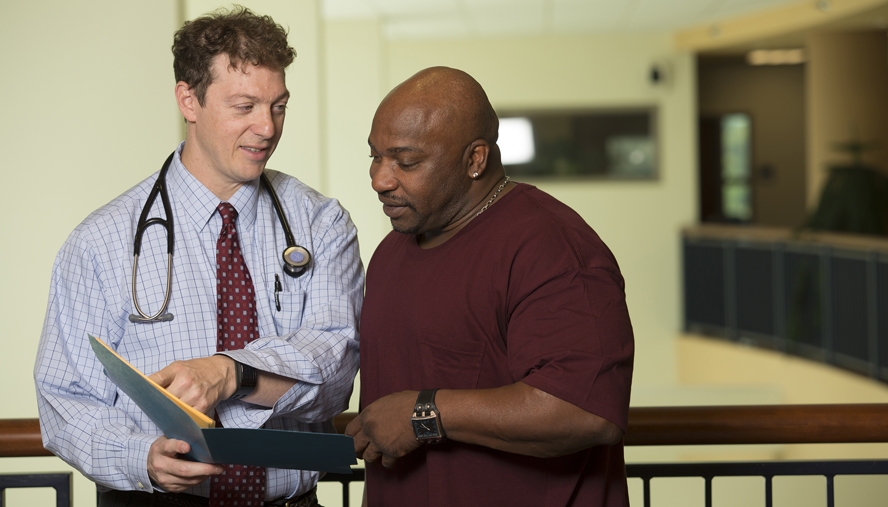Mepolizumab Helps Patients with Refractory Churg-Strauss Syndrome
Medication cuts exacerbations in half and reduces need for steroid medications
DENVER —
Mepolizumab, an anti-IL5 monoclonal antibody, demonstrated significant benefits for patients with refractory cases of the rare autoimmune disease Churg-Strauss Syndrome, according to research at National Jewish Health and other institutions. The phase III trial increased remission rates, cut exacerbations in half and reduced the need for ongoing corticosteroid therapy. The findings are being published in the May 18, 2017 issue of the New England Journal of Medicine.

“Mepolizumab offers an important advance that will improve the lives of Churg-Strauss patients,” said Michael Wechsler, MD, first author on the study and professor of medicine at National Jewish Health in Denver, CO.
In Churg-Strauss Syndrome, also known as eosinophilic granulomatosis with polyangiitis, specific types of white blood cells known as eosinophils accumulate in tissue, causing inflammation and tissue damage. Patients usually develop severe asthma and rhinosinusitis and later suffer damage to the lungs and other organs. It is often misdiagnosed as asthma. There are 500 to 1,000 new cases of Churg-Strauss diagnosed each year in the United States.
There is no cure and no approved treatment for the disease. It is most commonly treated with systemic corticosteroids and immunosuppressant medications, both of which come with significant side effects. In spite of these therapies, exacerbations of the disease, which may cause permanent organ damage, are common.
Mepolizumab is a monoclonal antibody that prevents the cytokine IL-5 from binding to receptors on the surface of eosinophils, which prevents their maturation, differentiation and proliferation. It has been an effective medication for various eosinophilic disorders including severe eosinophilic asthma.
The researchers enrolled 136 patients with relapsing/refractory Churg-Strauss in the first double-blind, placebo controlled trial of a medication for this disease. Patients continued with existing treatments of corticosteroids with or without additional immunosuppressant medications. Half received mepolizumab injections and half received placebo once every four weeks for 52 weeks.
For the primary outcome of remission, 28 percent of those receiving mepolizumab achieved remission for more than 24 weeks, compared to only 3 percent on placebo. Thirty-two percent of patients on mepolizumab were in remission at weeks 36 and 48, compared to only 3 percent of those receiving placebo. About half of patients receiving mepolizumab failed to achieve remission, compared to 80 percent of patients receiving placebo.
Relapse rates were cut in half for patients on mepolizumab, from 2.27 per year for those on placebo to 1.14 per year for those receiving medication.
During the last four weeks of the study, 50 patients (44 percent) receiving mepolizumab were able to reduce their average steroid dose to less than 4 mg/day compared to only 5 patients (7 percent) on placebo. Twelve patients (18 percent) receiving mepolizumab were able to discontinue steroid treatment completely, compared to only 2 (3 percent) receiving placebo.
“Patients receiving mepolizumab cut steroid doses and relapses in half,” said Dr. Wechsler. “That is a breakthrough for those patients.”
The study, funded by the National Institute of Allergic and Infectious Diseases and the pharmaceutical company GSK, was conducted at 31 academic centers and hospitals in nine countries.
National Jewish Health is the leading respiratory hospital in the nation delivering excellence in multispecialty care and world class research. Founded in 1899 as a nonprofit hospital, National Jewish Health today is the only facility in the world dedicated exclusively to groundbreaking medical research and treatment of children and adults with respiratory, cardiac, immune and related disorders. Patients and families come to National Jewish Health from around the world to receive cutting-edge, comprehensive, coordinated care. To learn more, visit njhealth.org or the media resources page.
Media Resources
We have many faculty members, from bench scientists to clinicians, who can speak on almost any aspect of respiratory, immune, cardiac and gastrointestinal disease as well as lung cancer and basic immunology.
Media Contacts
Our team is available to arrange interviews, discuss events and story ideas.
- Jessica Berry
303.398.1082 office
303.807.9491 mobile
berryj@njhealth.org - Adam Dormuth
303.398.1002 office
970.222.5034 mobile
dormutha@njhealth.org
